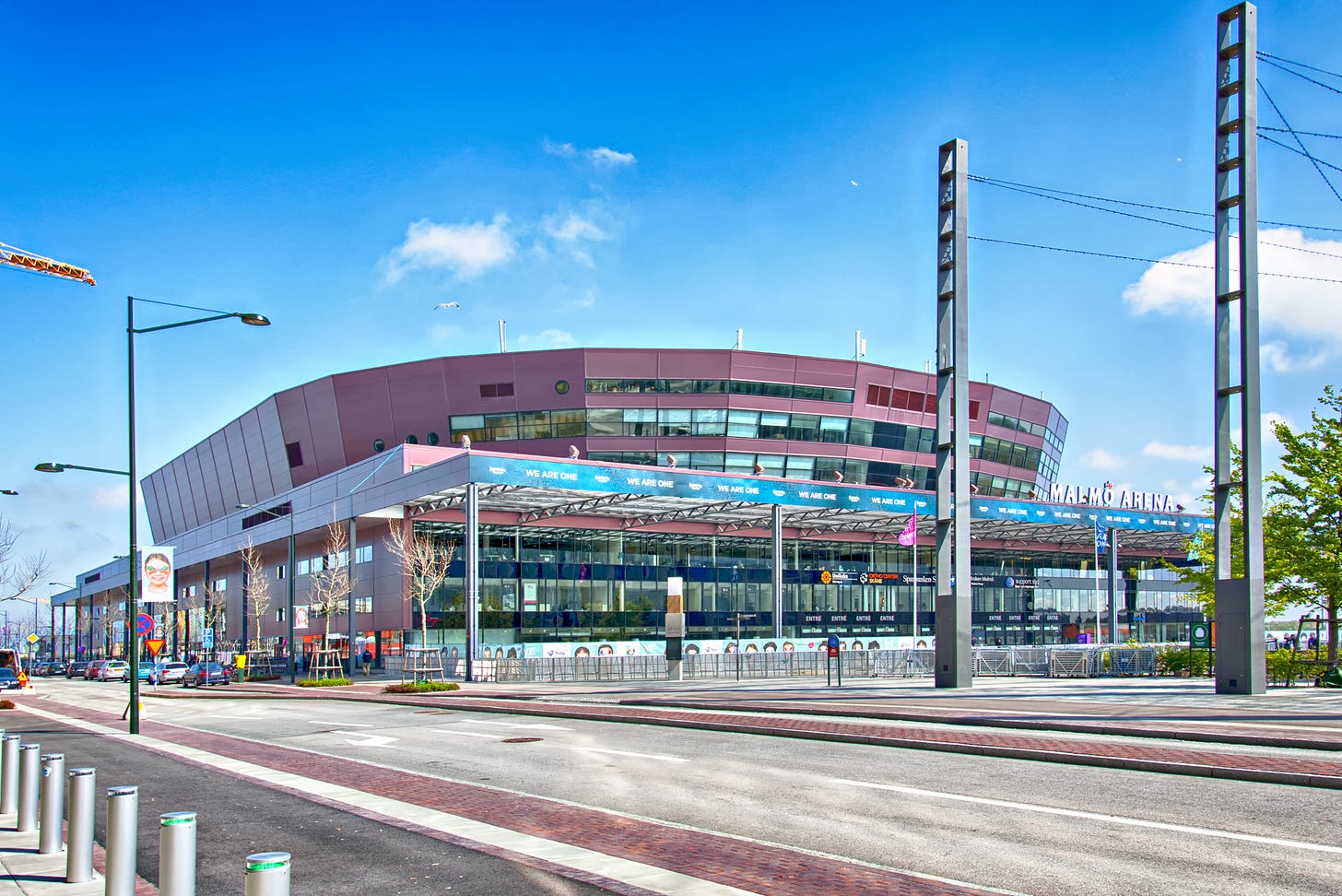Europeans on Song for Israel
Europeans long ago gave up on the notion that the Eurovision Song Contest is about musical talent. It has been overtly political for years. Neighbors vote for neighbors – or not, depending on relations at the time – and if one country is in a difficult spot, the others are usually generous and award it a maximum of 12 points.
The Eurovision began in the 1950s as a live TV experiment for the continent and has since gained a large cult following. It is common for people to host “Eurovision parties” and for pubs and bars to screen the event with great fanfare. The most famous musical group to emerge from the contest is undoubtedly ABBA, a Swedish foursome that won the competition in England in 1974 with their song “Waterloo.”
This year marked the 50th anniversary of ABBA’s win, and fittingly, the event took place in Sweden, specifically in Malmö. Sweden’s reputation has changed dramatically in the last decade or so, due largely to a substantial increase in immigration. However, Malmö is frequently singled out among its major cities and is widely considered a place to avoid. Approximately 20% of Malmö’s population is Muslim, and while the media tends to avoid acknowledging it, there are rumors that many of the city’s suburbs are characterized by ghettoization and crime, with the police often maintaining a safe distance. When thinking of Sweden, grenades may be the last things that spring to mind, but in reality, the country experiences hundreds of grenade attacks every year, almost always involving immigrants importing their homeland grievances.
It is against that background that this year’s Eurovision took place - the first since the Hamas terror attack on Israel last October. Israel was the first non-European country to enter the competition back in 1973, mainly because it is a member of the European Broadcasting Commission, which founded and still runs the event.
Eden Golan, a 20-year-old from Kfar Saba in central Israel, participated in this year’s event and performed her country’s entry, “Hurricane.” Golan is unapologetic in her pride in representing her country and is unquestionably brave. She took to the stage and waved the Israeli flag in front of tens of thousands of people, with armed guards flanking her on all sides.
From the moment she arrived in Sweden, Golan was protected by Swedish police and Israel security services, who formed a protective ring around her hotel room (which she wasn’t allowed to leave) and transported her to the venue in secure motorcades. Authorities constructed roadblocks on surrounding streets as anti-Israel demonstrators clashed with police and hurled rocks and fireworks in their direction.
Protests peaked on the night of the final, and Malmö’s city center effectively entered a lockdown.
The Eurovision winner is decided via two routes: points from a panel of “expert” judges and a public vote. The judges, who are typically prominent figures in the music industry, give their scores first. This year, they repeatedly awarded the maximum 12 points to the eventual winner from Switzerland, who identifies as “non-binary,” while giving a mere pittance to Israel.
At the end of the jury vote, Israel languished in 12th place with just 52 points. But then came the public vote, and an audible audience gasp as the hosts revealed that Europe had awarded Israel 323 points—the second-largest of the contest and much higher than the juries had given to the Swiss “non-binary” victor.
In country after country, Europeans took the ultra-rare opportunity to express the view of the entire continent and answer a question about one of the most significant global issues of our time. Europe gave its answer – Europe stands with Israel.
The UK, Germany, France, Sweden, Belgium, the Netherlands, Italy, Finland, Luxembourg, Portugal, San Marino, Spain, and Switzerland all awarded Israel maximum points. Several more nations awarded ten points, including Ireland, considered the most anti-Israel and left-wing country in Europe.
Ireland’s competitor, for the record, was also a “non-binary” individual who calls herself Bambie Thug. She was so upset that Israel was allowed to compete that she was reduced to tears when efforts to disqualify Eden Golan were unsuccessful. Bambie Thug, who performed a gothic-style track in vampire-esque attire, led efforts to exclude the world’s only Jewish state and was prevented by organizers from adding “free Palestine” labels to her costume. Bambie, who “respects” Satanism, finished sixth behind Israel, but only because “experts” awarded her 142 points. The public was less generous and gave her just 136.
The Israel-Hamas conflict habitually acts as a stark dividing line between left and right in Western politics. The extreme left sees the conflict as a wealthy, capitalist, Jewish state pummelling brown-skinned and impoverished people and, therefore, automatically aligns itself with the Palestinian cause. Even gay rights or women’s groups on the left tend to defend Hamas, despite the organization’s rather sketchy record in affording rights to either. The media, being in tune with the far left, sells the pro-Palestinian narrative almost unquestionably and routinely portrays Israel as an aggressor, occupying the lands of an oppressed Palestinian population.
The Eurovision Song Contest this year therefore revealed two astonishing and unexpected truths. Firstly, European people back Israel in the Middle East’s ongoing and bloody conflict, but just as importantly, the people of Europe are spectacularly out of alignment with their left-wing dominated media class.
Europeans are more than able to withstand relentless pro-Palestinian propaganda, and regardless of one’s view of the minutiae of the Middle East conflict or its history, Europeans showed that they recognize left-wing bullying and intimidation when they see it, and they’ve had enough of it.




